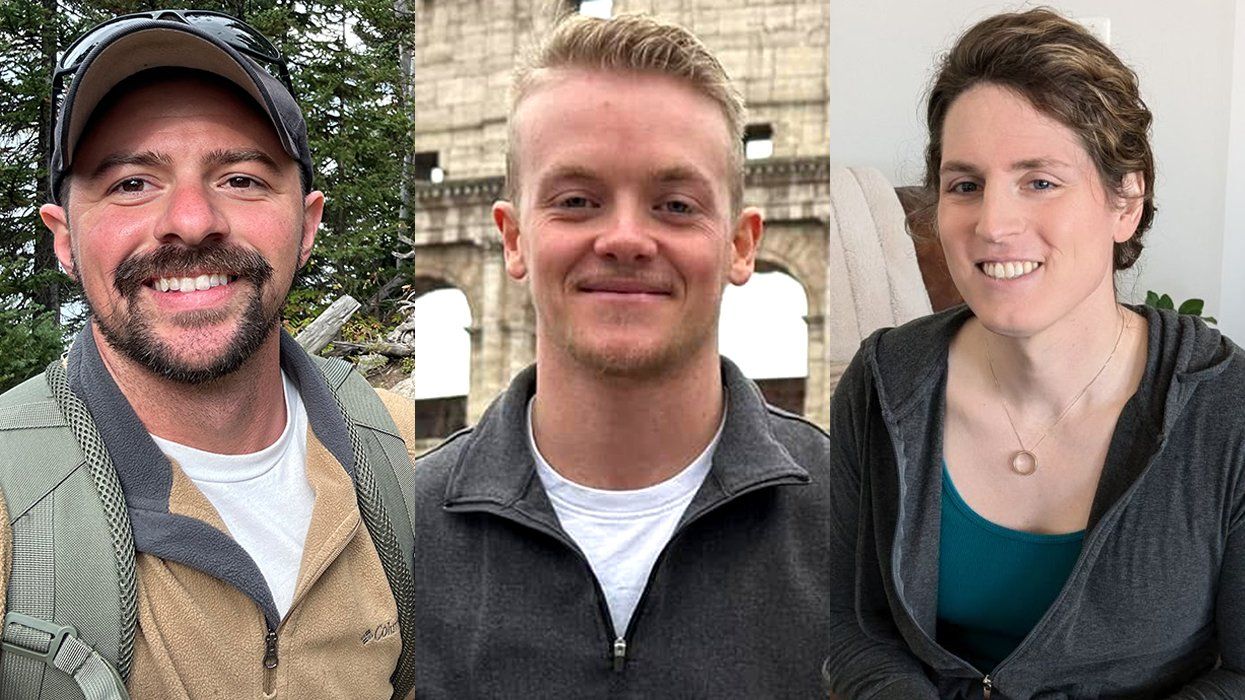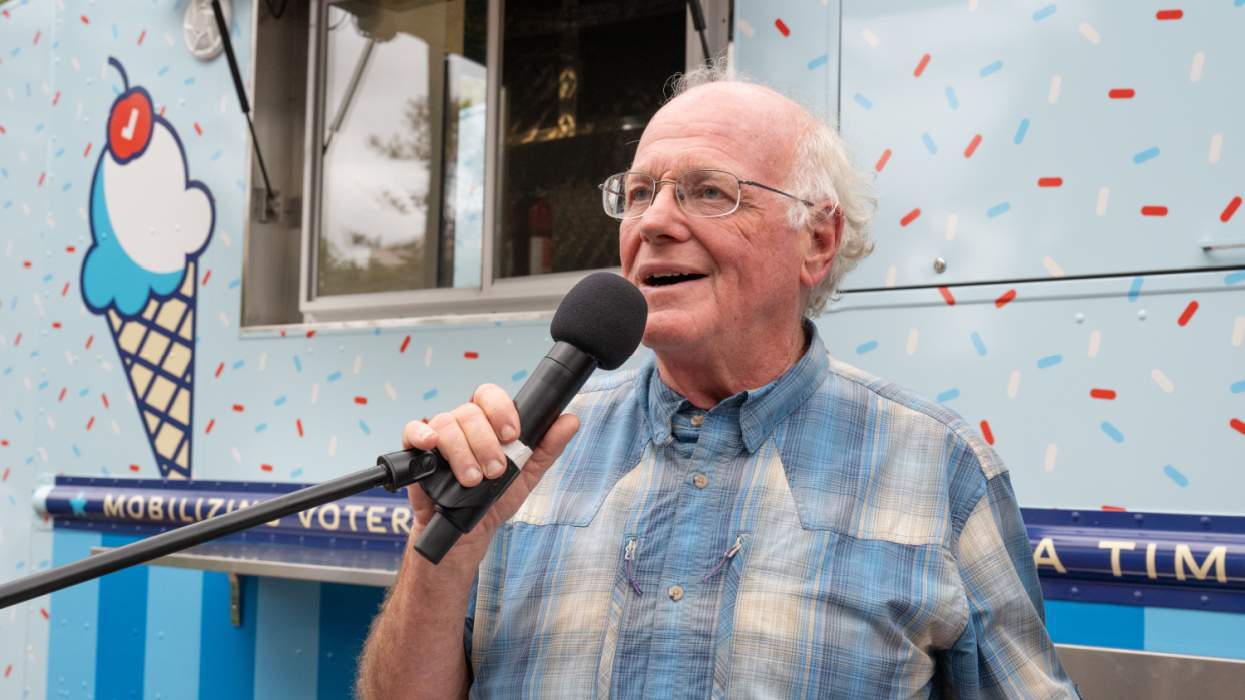Thirty-two transgender service members and recruits are urging the U.S. Supreme Court to reject a Trump administration request to reinstate the military’s ban on transgender personnel, warning that such a move would amount to an “unprecedented and un-American” purge of honorable, high-performing troops.
Keep up with the latest in LGBTQ+ news and politics. Sign up for The Advocate's email newsletter.
In a 23-page amicus brief filed Thursday in United States v. Shilling, the plaintiffs in Talbott v. United States—a parallel case challenging the same policy—laid out the sweeping damage the ban would cause if allowed to take effect. The brief, authored by GLAD Law’s Jennifer Levi and the National Center for Lesbian Rights’ Shannon Minter, both of whom are transgender, paints a stark picture of mass discharges, career destruction, and irreversible harm. The organizations are fighting for the rights of trans people on behalf of the plaintiffs.
Related: Meet the transgender Army lieutenant who is challenging Donald Trump's military ban
“If this Court grants Applicants’ request for extraordinary relief, thousands of transgender service members will face immediate discharge through administrative separation, a harsh process normally reserved for serious misconduct and failure to meet performance standards,” the brief states. “That outcome—the abrupt termination of service members who are meeting all military standards and serving honorably—would be unprecedented and un-American.”
Unlike the narrower “Mattis Policy” implemented under Trump’s first term, the current ban—reinstated via Executive Order 14183 in January—goes much further. The order, signed aboard Air Force One during Trump’s first week back in office, directed Defense Secretary Pete Hegseth to eliminate “gender radicalism in the military” and explicitly states that expressing a gender identity different from one’s sex assigned at birth is incompatible with military values.
It calls for the immediate expulsion of any service member who identifies as transgender, regardless of their performance, fitness, or years of honorable service. According to the brief, the so-called Hegseth Policy frames transgender identity not as a medical issue but as a character defect, branding trans troops as inherently lacking in “honesty,” “discipline,” and “integrity.”
“The government has not and cannot provide any rational reason to justify the systematic purge of transgender troops who are meeting all performance standards,” Levi said in a statement. “The naked animus within the language of the ban… makes clear that the ban is meant to describe people, not a medical condition.”
Minter added that the administration’s request “is asking for a shocking, unprecedented purge of thousands of current servicemembers for a reason unrelated to their ability to serve.”
Related: This trans Air Force recruit wants to jump out of planes to save others. He's suing Trump to serve
The policy’s use of administrative separation—typically reserved for misconduct—adds insult to injury. The brief warns that the process leaves a “serious stain” on a service member’s record, branding them as deficient despite meeting every standard. “The Military Ban will upend lives and ruin the careers of thousands of persons,” it states, quoting Washington, D.C., U.S. District Judge Ana Reyes’ earlier ruling blocking the policy in Talbott, which remains on appeal.
At oral arguments before the D.C. Circuit on April 22, the Department of Justice faced a skeptical three-judge panel. DOJ attorney Jason Manion struggled to explain how the ban would be implemented, how many troops it would affect, or why the military couldn’t maintain the status quo. Judge Cornelia Pillard called out the policy’s core contradiction: “Someone who has never been diagnosed with gender dysphoria but who has transitioned is explicitly banned… It’s clearly banning all transgender persons.” When Manion insisted the policy focused on deployability, she retorted, “Your argument is that you can serve as a transgender person as long as you don’t serve as a transgender person. Is that right?”
The stakes aren’t theoretical for those at the center of this legal battle. They’re personal.
Lt. Nicolas Talbott, the lead plaintiff in the case, has spent nearly a decade fighting to serve openly. After excelling in basic training and earning his commission, Talbott now leads soldiers as an Army Reserve officer and plans to transition to active duty this year. “I’ve done everything they said I couldn’t do,” he told The Advocate. “And I’ll keep proving them wrong.”
Maj. Erica Vandal, a Bronze Star recipient and West Point graduate, has served 13 years without a missed work day since beginning her transition. “Being transgender has had no impact on my military readiness,” she told the court. A forced discharge would not only jeopardize her career—it would strip her children of GI Bill benefits and health care.
And Clayton McCallister, an Air Force recruit preparing for one of the most physically demanding roles in special warfare, says he’s ready to jump out of planes to save others. “I’ve met every standard. I’ve proven that I can do this job. And yet I still have to fight just for the chance to serve my country,” he said.
Related: Transgender Army officer Erica Vandal was born into military service. Now, she's suing Trump to stay in
Their stories mirror the findings of federal judges, who have repeatedly rejected the administration’s claim that transgender service undermines readiness. As Judge Reyes wrote, “The same medications and surgeries banned for trans troops are routinely approved for cisgender ones.”
Still, the administration is pressing the Supreme Court to lift the injunctions currently blocking the ban’s implementation. However, the Talbott brief argues that doing so would cause irreparable harm to thousands while offering no concrete benefit to the military.
“Applicants have asserted no… ongoing and concrete harm” from allowing trans troops to serve, the brief notes, adding that the military already has ample mechanisms to address performance, conduct, and medical concerns without blanket bans.
SPARTA Pride, a nonprofit of more than 2,000 transgender military personnel and veterans, echoed the plaintiffs’ message. “Transgender Americans have served openly and honorably in the U.S. Armed Forces for nearly a decade,” the group stated in response to the ban. “Thousands of transgender troops are currently serving and are fully qualified for the positions in which they serve.”
SPARTA noted that trans troops fill critical roles in combat arms, aviation, nuclear engineering, law enforcement, and intelligence, adding, “The readiness and physical capabilities of transgender service members [are] not different from that of other service members.”
The court’s decision could come at any moment.
















Charlie Kirk DID say stoning gay people was the 'perfect law' — and these other heinous quotes
These are some of his worst comments about LGBTQ+ people made by Charlie Kirk.